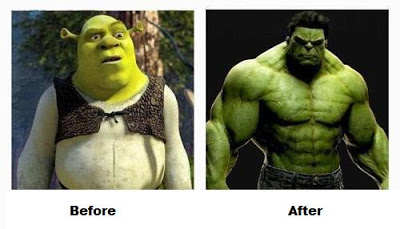Saying, “It works for me,” is exactly like saying, “I have a tickling fetish.”
I’m a big fan of Dan Savage’s “Savage Love” and his Lovecast. It’s so refreshing to listen to someone who gives practical advice in such a sex-positive (about as sex-positive as you can get really) fashion. I’m currently listening to his new book, “American Savage”, and it’s great (mostly because he narrates it.) At any rate, with so much “advice” out there, the overarching message that has filtered its way through the morass has been “Find what works for you.” Read More...
How statistics can protect your willpower

Today is Valentine’s Day (Happy Valentine’s/Bitter Single’s Day!). So I thought I’d give my post a brain-washing theme (cynical much? 🙂 )
With the advent of Instagram, Facebook, Twitter and now, Vine, the power of the testimonial has never been greater. It’s easy to be bombarded by images of amazing before and after, and even “now” photos of clients of trainers and nutritionists, all trying to cajole their way into your mind and ultimately into your wallet. Googling the terms “fitness”, “marketing” and “testimonial” returns over 100,000 hits, the first few pages of which are testimonials on how testimonials can help grow a fitness business. How’s that for meta? Read More...
Burn the boats: Why you’re going to fail. Or not.
 I’ve been studying and reading health research for decades, and this post is just a bit of my biased gestalt on the state of affairs on obesity, obesity research and the new hope that arises within a TON of people every January.
I’ve been studying and reading health research for decades, and this post is just a bit of my biased gestalt on the state of affairs on obesity, obesity research and the new hope that arises within a TON of people every January.
The preponderance of obesity research indicates that most of you will fail at achieving your goal of weight loss this year; and that of those of you who succeed at achieving the goal within this particular year will ultimately fail because the data generally shows that the weight comes back, resulting in a net effect of zero. What we don’t fully understand still, is why this failure happens; and I’m not sure that we’re going to truly unearth it anytime soon enough to make a difference in your resolution this year. Read More...
Why isn’t overeating an eating disorder?
My position on the proposed “Muscle Dysmorphia” remains unchanged. I do not feel it belongs in the DSM in its current state, largely due to the subjective criteria for its proposed diagnostic criteria, which depends entirely on whether the diagnostician feels the patient is already “muscular enough”. Read More...
Anecdotal Evidence-Based Fitness
At some point in every fitness-writer/blogger’s lifespan, there comes a point where the rubber has to meet the road. We write about fitness and nutrition and body-image, but I’m sure there are many bloggers who can (and I apologize for the use of two cliches in two sentences) talk the talk, but can’t, don’t or won’t walk the walk.
And at some point in every fitness-writer/blogger’s lifespan, there has to be come form of accountability for what he or she writes. A proponent of supplement X should probably be using supplement X and not just writing in favour of it to get paid if they really think it works. A writer who believes in workout A enough to rave about it should probably be able to show that it works at least for themselves. It’s of little value to say, “X totally works and everyone should be using X, but I don’t.” Read More...
